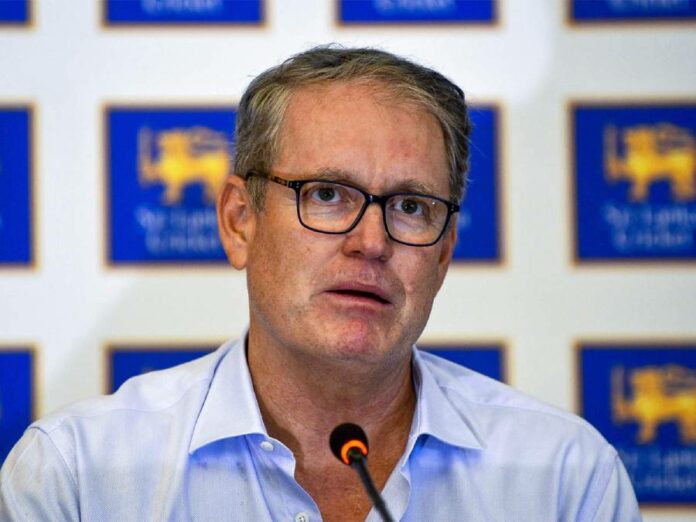The pay cut that Sri Lanka’s cricketers, particularly the seniors, have been forced to go take is quite significant.
Some of them are set to lose as much as US$ 50,000 on their annual retainers. Although there’s no significant change of match fees, what has been taken out is seniority payment which has made the players feel the pinch. There’s a standoff between the players and the administration but by the looks of it, the players are left with no choice but to sign.
Although there’s lot of criticism on some of the aspects in the contract, the Cricket Advisory Committee was left with little choice other than to bring stringent measures to put cricket back on track after four years of underperforming.
Listening to Tom Moody the other day gave you superb insight into what he intends to achieve – to take Sri Lanka into the top five inthe ICC Rankings across all three formats. The means he is going to get there is by pushing players. He is going to anger a few people along the way, but Moody’s thinking seems to be that desperate times need desperate measures.
The story is that there were a few harsh words spoken behind closed doors between the Director of Cricket and some seniors but you are not going to intimidate him by that. He has dealt with tougher blokes in two decades of coaching, having spent time at Worcester, Western Australia, Sri Lanka and several franchises in T-20 leagues.
One of Sri Lanka’s most successful tours to England was in 2006. The openers – Jehan Mubarak and Upul Tharanga – were quite new and were struggling in early summer, not being able to make an impact in the warm-up games. So, Moody approached a senior player, with a good technique and temperament, requesting him to open batting. The senior player who had established himself in the middle order, refused. Moody ensured that the player never represented Sri Lanka again as long as he was coach. To his credit, the player made a comeback and went on to score more than 5000 Test runs. He could have gone onto play 100 Tests had he not crossed Moody’s path.
A bone of contention in the new contracts is that your performance counts more than your seniority. While 50 points have been allocated for performance, there’s 20 points for fitness. So basically, a player has to maintain skinfolds below 75 and finish the two kilometer run in less than eight minutes and 35 seconds to earn the full 20 points. Anyone who is not up to the mark will lose money.
It’s a move that needs to be welcomed because otherwise lessons aren’t going to be learned and our fitness levels are one of the lowest in the world. Rarely a series passes by without a player breaking down in the middle of a match.
Moody’s frustration is understandable. When he was in charge of the team from 2005 to 2007, Sri Lanka were easily one of the best fielding sides and their fitness levels had set the benchmark in the Asian region. Today, India has become a different beast altogether.
So, it’s sensible for all concerned in cricket to fall in line with the current minimum required fitness standards rather than shooting the messenger.
Instead of doling out money on a seniority basis what Moody has done is to introduce a performance-based system. Let’s say Sri Lanka beat number one ranked England in the upcoming ODI series, they are entitled for a winning bonus of US$ 75,000. Even winning against the number three ranked team carries a bonus of US$ 62,500. Reading between the lines, you can sense that Moody is gradually working towards his dream of improving the nation’s current ICC standings.
Sri Lankan players do not cover themselves in glory given their current ICC Rankings; eighth in Tests and T-20s and ninth in ODIs. None of the players rank in the top ten for batsmen, bowlers or all-rounders in Test and ODI cricket. Wanindu Hasaranga and Lakshan Sandakan are placed ninth and tenth in T-20 bowling but that is not much consolation, and the players have little bargaining power when that is the case.
Usually during pay disputes, the public and the press take the side of the players. Invariably the players bring fans joy and excitement so people are happy when players are well remunerated. This time though it’s different for the simple reason our performances have been below par. You also tend to get the feeling that the players have been not pushing themselves, opting for the easy way out.
There’s only one way for the seniors and that is to fall in line and move forward. Already by leaving them out of the shorter formats of the game some sort of message has been sent and it looks as if the seniors are fighting a losing battle.
There are of course exceptions like skipper Dimuth Karunaratne, who posted a superb hundred early this year at the Wanderers and then accumulated 427 runs in three innings at Pallekele against Bangladesh. The value for his runs will be seen when contracts are up for grabs next year. His fitness levels and leadership qualities bring him full points and he could easily move from the current US$ 70,000 range to the top category of US$ 100,000.




















